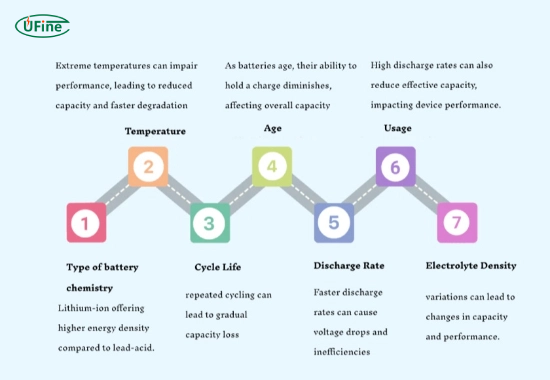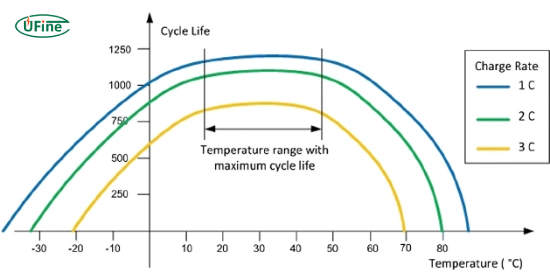Batteries are integral to our daily lives, powering everything from smartphones to electric cars. However, one common frustration is their limited lifespan. How can you make your batteries last longer and get the most out of them? The good news is that with proper care, you can significantly extend the lifespan of your batteries, whether you use them in electronics, vehicles, or other devices. This article will explore proven strategies to help maintain your batteries’ health, save money, and reduce waste.
Part 1. What factors affect battery lifespan?
The lifespan of a battery depends on several factors, including its type, usage patterns, and maintenance practices. Here are the key contributors:
- Battery chemistry: Lithium-ion batteries, for example, are common in electronics and have a high energy density, but they degrade over time with repeated charge cycles. Lead-acid batteries used in cars have different maintenance requirements.
- Charge and discharge cycles: Each battery has a limited number of charge cycles. Excessive charging or deep discharges can shorten its lifespan.
- Temperature: Extreme heat or cold can negatively impact battery health. Batteries perform best in moderate temperatures.
- Storage practices: Deterioration can result from improper storage conditions, such as leaving a battery discharged for long periods.
Understanding these factors is the first step to ensuring your battery lasts as long as possible.
Part 2. How to charge your batteries properly?
One of the quickest ways to reduce a battery’s lifespan is by charging it incorrectly. Here are some tips to charge them the right way:
1. Avoid overcharging
Overcharging occurs when a battery remains plugged in after it’s fully charged. This can generate excess heat and degrade the battery over time. Modern devices often have built-in mechanisms to prevent overcharging, but it’s still a good habit to unplug once your device reaches 100%.
2. Use the correct charger
Always use the charger designed for your specific device or battery type. Using cheap or incompatible chargers can result in inefficient charging and damage to your battery.
3. Charge at the right time
For most batteries, it’s ideal to charge them before they drop below 20% and unplug them once they reach around 80-90%. This reduces strain on the battery and extends its lifespan.
Part 3. How does temperature impact battery life?
Temperature plays a critical role in battery performance and longevity. Here’s how:
1. Avoid extreme heat
Excessive heat can permanently damage your battery. For example, leaving your phone in direct sunlight or charging it in a hot car can cause overheating. Always charge and store your batteries in a cool, dry place.
2. Beware of freezing temperatures
Cold temperatures can temporarily reduce a battery’s capacity. If you’re storing batteries in freezing conditions, consider using insulated storage to protect them.
3. Use temperature-optimized devices
Some devices have thermal management systems that regulate battery temperature during charging and use. If you’re using such devices, follow the manufacturer’s recommendations for optimal performance.
Part 4. Does partial charging help batteries last longer?
Yes, partial charging can extend the lifespan of certain types of batteries, especially lithium-ion batteries. Here’s why:
- Minimizes stress: Charging a battery to 100% every time puts stress on its cells, leading to faster degradation. Keeping the charge level between 20% and 80% is often better.
- Reduces heat: Fully charged batteries tend to generate more heat, which can damage them over time.
If you’re using a smartphone or similar device, many manufacturers now include software features like “optimized charging” to keep the battery in the ideal range.
Part 5. How should you store unused batteries?
Proper storage is essential to maintaining the health of unused batteries. Follow these guidelines:
- Store in a cool, dry place: Heat and humidity can degrade battery cells. Keep batteries in a location with stable, moderate temperatures.
- Maintain a partial charge: Store lithium-ion batteries at around 50% to prevent deep discharge or overcharging.
- Avoid prolonged storage: Batteries lose capacity over time, even when unused. Try to use and recharge stored batteries periodically.
How to Store 18650 Batteries Safely?
Part 6. What are the best practices for extending battery life in smartphones?
Smartphone batteries are notorious for degrading over time. Here’s how Here’s how the process works:
1. Enable battery-saving features
Most smartphones have built-in power-saving modes that reduce background processes, screen brightness, and other power-hungry features.
2. Avoid fast charging
While fast charging is convenient, it generates more heat, which can reduce battery lifespan. Use regular charging when possible.
3. Turn off unnecessary features
Disable Bluetooth, GPS, or Wi-Fi when you’re not using them. This reduces the battery’s drain.
4. Keep software updated
Manufacturers often release software updates that optimize battery performance, so keeping your device up to date can help.
Part 7. How to extend the life of car batteries?
Car batteries, particularly lead-acid batteries, require specific care to maximize their lifespan. Here are some tips:
- Regularly check water levels (for non-sealed batteries): Ensure the electrolyte levels are adequate and refill with distilled water if needed.
- Start your car periodically: If you don’t drive often, start your car every few days to keep the battery charged.
- Clean the terminals: Corrosion on battery terminals can affect performance. Clean them with baking soda and water, then apply a thin layer of petroleum jelly to prevent further corrosion.
- Avoid short trips: Frequent short drives must give the alternator more time to recharge the battery. Combine errands into more extended trips.
Part 8. Does turning off devices help save battery life?
Yes, turning off devices or putting them in a low-power mode when not in use can conserve battery life. For example:
- Shut down laptops overnight instead of leaving them in sleep mode.
- Turn off gaming consoles when not in use.
- Use smartphone airplane mode to limit power consumption when you don’t need connectivity.
- Reducing unnecessary power draw can extend your battery’s runtime and lifespan.
Part 9. Are battery maintenance apps worth it?
Battery maintenance apps claim to optimize your device’s battery life, but are they effective? The answer depends on the app:
- Valuable features: Some apps provide helpful tools like monitoring battery health and identifying power-hungry apps.
- Unnecessary functions: Many apps claim to “boost” your battery but simply close background processes, which can restart and drain power again.
Stick to trusted apps provided by your device manufacturer or reputable developers.
Part 10. FAQs
-
How often should I charge my battery?
To minimize wear, you should charge your battery before it drops below 20% and unplug it once it reaches 80-90%. -
Can I leave my device plugged in overnight?
While modern devices prevent overcharging, leaving them plugged in overnight can generate heat and degrade the battery over time. -
What’s the best way to store a battery I’m not using?
Store your battery in a cool, dry place with a partial charge (around 50%) to prevent deep discharge or overcharging. -
Do fast chargers damage batteries?
Fast chargers generate more heat, which can reduce battery lifespan over time. Use them sparingly. -
Should I completely drain my battery before recharging?
No, completely draining your battery can cause stress and shorten its life. Partial charging is better for most batteries.
Related Tags:
More Articles

Learn About 8s Lipo Battery
What is an 8S LiPo battery? Learn its voltage, specs, features, use cases, lifespan tips, and more. Perfect for high-power RC and industrial devices.
Understanding LiPo Circular Batteries
Learn LiPo circular batteries—advantages, customization options, applications, and more. Learn how to choose the right round battery for your device.
Should Batteries Be Stored in the Fridge?
Storing batteries in the fridge can cause damage. Keep them in a cool, dry place at room temperature for best performance.
Learn Circular Saw Battery
Discover the best circular saw battery types, voltages, and how to extend battery life. Learn all you need before buying. Get expert tips and real answers here.
Flat Circle Battery: Key Benefits and Unique Design
Flat circle batteries are slim, round lithium-ion cells used in compact devices for high energy density and long-lasting power.






